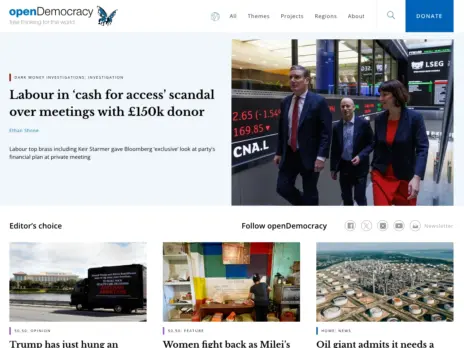
Financial Times editor Lionel Barber last night condemned use of subterfuge at the Daily Telegraph and News of the World and urged Fleet Street to get its house in order lest it face Government “retribution”.
Delivering the Cudlipp Lecture at the London College of Communications, Barber condemned a ‘supine’Press Complaints Commission and warned that newspapers risked state regulation if they did not tackle the issues raised by the News of the World phone hacking scandal.
Quoting Harold Evans, Barber said that ‘deception may ultimately be justified in the pursuit of the public interest, but it must only be used in the most exceptional circumstances”. He said that deception had never been used to obtain a story at the Financial Times, to his knowledge.
Barber warned that use of subterfuge can be ‘deeply corrosive not just to the newspapers bond with its readers but also to the body politic”.
And citing the Daily Telegraph’s December story in which two journalists posed undercover as constituents to interview Vince Cable and other Lib Dem ministers he said that it ‘falls into a very different category than its earlier scoop on MPs expenses”.
Barber said: ‘The latter story, though acquired for money and deeply damaging to the standing of the Westminster class, clearly met the public interest test; the first did not. It was nothing more than entrapment journalism.”
But he added that the Telegraph story ‘pales by comparison with the phone-hacking scandal which has engulfed Rupert Murdoch and News International and jeopardised his bid to take full control of BSkyB, the highly profitable satellite TV channel”.
Noting that he worked for Murdoch at the Sunday Times 25 years ago, Barber said: ‘I have nothing but admiration for how he took on the print unions and forced through change. He saved the British newspaper industry.”
But he added: ‘The phone-hacking scandal marks a watershed – not just for News International but also for tabloid journalism…
‘True, the practice of phone-hacking was widespread (and not only among the tabloids). The Information Commissioner’s report in 2006 showed that 305 journalists used private investigators. The number may well have been higher.
‘And yet, beyond the conviction of one News of the World journalist and one private investigator, the infamous Glenn Mulcaire, no serious action was taken against them; not by the police, not by the courts, and not by the Press Complaints Commission.
‘The PCC was supine at best. And while the Metropolitan Police has now re-opened its inquiry, many questions remain about why it did not pursue the original News of the World investigation with sufficient rigour.”
Barber also took issue with the newspaper industry itself for not taking the issue of phone-hacking seriously enough.
He said: ‘Aside from the lead taken by the Guardian, which was followed by the FT, BBC and Independent, the rest of the newspaper industry took a pass on the News of the World phone-hacking story – almost certainly because they too were involved in ‘dark arts’.
‘Indeed it took a foreign newspaper – the New York Times – to break fresh ground after an investigation lasting many months. For all that period and more, a conspiracy of silence ruled Fleet Street.
‘As for News International itself, the management failed to follow the advice its newspapers would have given business or any other public figure in similar circumstances: own up rather than cover up, come clean rather than surreptitiously paying off aggrieved celebrities such as the publicist Max Clifford.
‘The suspicion must remain that News Corporation assumed that it enjoyed enough power and influence in Britain to make the phone hacking controversy go away.
‘Now, thanks to the overwhelming opposition of its news industry rivals to its bid for BSkyB, that influence is under threat as never before.
‘News Corporation can argue, with some justification, that opposition to its BSkyB bid is motivated by base commercial interests rather than a high-minded concern over media plurality.
‘Yet the concentration of broadcast and print power which would result from a fully combined BSkyB and News International’s titles is troublesome, especially in the light of still unresolved questions about the extent of phone hacking at the News of the World. The bid deserves proper scrutiny by the authorities.
‘Promises about editorial independence for Sky should be judged in the light of repeated assurances that the phone hacking was the work of a lone actor at the News of the World.”
Barber warned that failure to ‘clean house at all news organisations’would leave the press at risk of ‘retribution in the form of statutory regulation”.
He said: ‘Many MPs are itching to retaliate for the humiliation of the expenses scandal, but statutory regulation would be a grave step in the wrong direction. Press freedom is woven into the fabric of our nation.
‘We do not want to go down the same road as countries such as Argentina, Hungary and South Africa which have adopted or are about to adopt new laws curbing press freedom.”
Calling for British journalists to ‘conduct a rigorous collective self-examination”, he said: ‘Journalism is not perfect, nor was it ever meant to be. But we have allowed our standards to lapse. Let us hope we have not left it too late.”
Email pged@pressgazette.co.uk to point out mistakes, provide story tips or send in a letter for publication on our "Letters Page" blog






